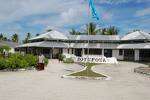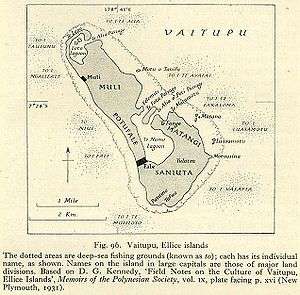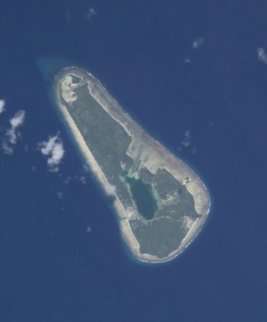Motufoua Secondary School
| Motufoua Secondary School | |
|---|---|
 | |
| Location | |
|
Vaitupu Tuvalu | |
| Coordinates | 7°29′24″S 178°41′37″E / 7.49000°S 178.69361°ECoordinates: 7°29′24″S 178°41′37″E / 7.49000°S 178.69361°E |
| Information | |
| Type | boarding school |
| Denomination | Church of Tuvalu |
| Established | 1905 |
| Headmaster | Siautele Lito[1] |
| Gender | boys and girls school |
Motufoua Secondary School is boarding school for children on Vaitupu atoll.[2][3] As Tuvalu consists of 9 islands the students reside on Vaitupu during the school year and return to their home islands during the school vacations. Vaitupu received worldwide attention in March 2000, when a fire in a dormitory at the school killed 18 girls and an adult supervisor. It was later discovered that the fire was caused by a student using a candle to read during the night.[4][5][6] The School celebrated 100 years of education in 2005.[7][8] In 2009 the student roll at Motufoua Secondary School was 550.[9]
Establishment of the School

The London Missionary Society (LMS) established a primary school at Motufoua on Vaitupu in 1905. The purpose was to prepare young men for entry into the LMS seminary in Samoa. This school evolved into the Motufoua Secondary School.
The activities of the LMS were taken over by the Church of Tuvalu. From 1905 to 1963 Motufoua only admitted students from Church of Tuvalu schools. In 1963 the Church of Tuvalu and the administration of the Gilbert and Ellice Islands colony began to co-operate in providing education and students were enrolled from government schools. In 1970 a secondary school for girls was opened at Motufoua.[10]
In 1974, the Ellice Islanders voted for separate British dependency status as Tuvalu, separating from the Gilbert Islands, which became Kiribati. The following year the Tuvaluan students that attended school on Tarawa were transferred to Motufoua. From 1975 the Church of Tuvalu and the government jointly administered the School.[10] Eventually administration of Motufoua became the sole responsibility of the Department of Education of Tuvalu.
Principals of the School
Reverend Sir Filoimea Telito, GCMG, MBE started out as a teacher at Motufoua. After completing theological studies, he returned to Motufoua to serve as Pastor. Later he became Principal of Motufoua, then in April 2005 he was appointed to be the Governor-General of Tuvalu.[11]
The current Principal is Siautele Lito.[1] The previous Principal was Mosese G. Halofaki an expatriate from the Republic of the Fiji Islands.[12]
Motufoua as a government school


Motufoua Secondary School is now operated by the government of Tuvalu, while still retaining a connection with the Church of Tuvalu through the use of the Motufoua School Church and with a chaplain as a member of the staff of the School.[13] The students attend church services at the Motufoua School Church.[14]
The fire on 9 March 2000 was a traumatic event within the School and for Tuvalu and raised questions as to fire safety equipment and training and security practices in the dormitories at the School.[15] A memorial service was held the following year in memory of the eighteen school girls and their matron who tragically lost their lives.[16] Tuvaluan leaders as well as parents of the victims attended the memorial service. The Tuvalu Philatelic Bureau also commemorated the event.[17]
The pupil-teacher ratio for secondary education is 25:1 (2001/02).[18] Motufoua offers Forms 3‐6, with the students studying for the Fiji Junior Certificate (FJC) at Year 10, Tuvaluan Certificate at Year 11 and the Pacific Senior Secondary Certificate at Year 12,[19] which is set by the Fiji-based exam board SPBEA.[20]
Sixth form students who pass their Pacific Secondary School Certificate (PSSC) go on to the Augmented Foundation Programme, funded by the government of Tuvalu.[21] This program is required for tertiary education programmes outside of Tuvalu and is available at the University of the South Pacific (USP) Extension Centre in Funafuti. In 2009 a vocational stream at Year 12 was introduced at Motufoua. The vocational stream provides training for students that do not intend to go on to tertiary education.[9]
Education in the 21st Century
Motufoua Secondary School has a central role in the development of Tuvalu. The education strategy is described in the national strategy plan Te Kakeega II as being that "by 2015, guided by strong spiritual values enshrined in its motto....TUVALU MO TE ATUA.... we will have achieved a healthy, educated, peaceful and prosperous Tuvalu."[22]
The school staff include Tuvaluan teachers and teachers from other countries. The vision for the School is that "Culture, faith and education are the foundation" with the education mission being "to provide an excellent, relevant and accessible secondary education and training on the strong base of practical application of knowledge and skills. We have a special responsibility of maintaining Culture and tradition. We derive our strength from being the only Government Secondary School."[23]
Motufoua has limited library facilities and the school has limited numbers of computers.[24] In 2011 the School offered a course in computer studies for the first time. In 2012 the School offered the Certificate IV in Information Technology through a franchise program from the Fiji National University.[25]
Atufenua Maui and educators from Japan have worked on the implementation of an e-learning pilot system for Motufoua Secondary School that applies the Modular Object Oriented Dynamic Learning Environment (Moodle).[26] The e-learning system is intended to benefit students at Motufoua Secondary School and to provide computer skills to students who will enter the tertiary level of education outside Tuvalu.[27]
Environmental sustainability
In 2010 what was described as the largest diesel-solar photovoltaic (PV) hybrid electricity system in the South Pacific was installed at the School.[28] This hybrid electricity system results in the School being supplied by a solar system during the day and by a diesel generator at night. This hybrid system is part of government policy to increase the use of renewable energy sources. Prior to the installment of the system the School relied upon a diesel powered generator, which needed to be turned off during the night. The hybrid system systems saves thousands of dollars in diesel costs and provides the School with a 24-hour supply of energy, with up to 200 kW per day.[29]
Development of Motufoua Secondary School funded by Japan
Japan has assisted with the development of Motufoua Secondary School. In 1996 Japanese assistance to the School overcome the problems associated with shortage of facilities include building classrooms, dormitories, special classrooms, dining hall and kitchen. In 2011 Japan provided assistance through its Grant Aid scheme to build 12 new classrooms, dormitories for students, and a gymnasium. In addition, the existing buildings previously funded by Japan were also renovated.[30] The new facilities funded by Japan also include a multi-purpose hall, tennis, volleyball & basketball courts and procurement of library, medical, administration, kitchen and computer equipment.[31]
References
- 1 2 "Press Release 2013: Embassy of Japan in the Republic of the Fiji Islands (Japan Provides Funding Assistance for the Project for Improvement of Water Supply System for Nanumea Island and the Project for Procurement of a Tractor for Motofoua Secondary School of Tuvalu)". Embassy of Japan in the Republic of the Fiji Islands. 20 March 2013. Retrieved 25 June 2013.
- ↑ "Motufoua Secondary School (Location)". Retrieved 20 November 2012.
- ↑ "Motufoua Secondary School". wikieducator.org. Retrieved 20 November 2012.
- ↑ Johnston, Martin (30 June 2000). "Student to blame for Tuvalu fire". New Zealand Herald. Retrieved 11 April 2015.
- ↑ Keith-Reid, Robert (10 March 2000). "Schoolgirls die in horror blaze". The Independent (London). Retrieved 20 November 2012.
- ↑ "19 Die In Tuvalu Dormitory Blaze". CBS news (US). 10 March 2000. Retrieved 20 November 2012.
- ↑ Laafai, Monise (October 2005). "Motufoua School, 100th Anniversary, 1905-2005". Monise Laafai. Retrieved 20 November 2012.
- ↑ "100 Tausaga Motufoua - 'Pepese Ia i le Pese'". Video on YouTube sung & performed by Fagogo Malipolipo. 14 February 2009. Retrieved 20 November 2012.
- 1 2 Salanieta Bakalevu (Project Coordinator), David Manuella, Tuvalu USP Campus (June 2011). "Open Schooling as a Strategy for Second‐chance Education in the Pacific: A desk study report" (PDF). Commonwealth of Learning (COL) / University of the South Pacific. pp. 96–100. Retrieved 20 November 2012.
- 1 2 Eneke Sapoaga (Hugh Laracy (ed.); et al. (1976). "ch. 19 'Post-War Development'". Tuvalu A History. University of the South Pacific/Government of Tuvalu.
- ↑ "State Funeral of the late former Governor General of Tuvalu, Reverend Sir Filoimea Telito, GCMG, MBE" (PDF). Tuvalu Philatelic Bureau Newsletter (TPB: 01/2011). 25 July 2011. Retrieved 20 November 2012.
- ↑ "Principal of Motufoua Secondary School". PATVET Secretariat of the Pacific Community. Retrieved 20 November 2012.
- ↑ "Motufoua School Church: Religious Building near Saniuta". Retrieved 20 November 2012.
- ↑ "Motufoua Secondary School students, gathering for their evening devotional". Video on YouTube. 1 March 2012. Retrieved 20 November 2012.
- ↑ Seluka, Marica (March 2000). "Motufoua Fire Tragedy - The Story from Tuvalu". Tuvalu Philatelic Bureau Newsletter/Tuvalu Online. Retrieved 20 November 2012.
- ↑ Resture, Jane (March 2001). "Photographs taken by Clive Smith at the Motufoua Memorial Service 9th March 2001". Retrieved 20 November 2012.
- ↑ "Tuvalu to Issue Stamps for Motufoua Fire Victims". Tuvalu Online. 27 February 2001. Retrieved 20 November 2012.
- ↑ Paul Bacsich; Nikki Cortoos; Tom Levec. "Researching Virtual Initiatives in Education (Tuvalu)". Retrieved 20 November 2012.
- ↑ "Basic Education (Tuvalu)". UNESCO Bangkok. Retrieved 20 November 2012.
- ↑ "Pacific Senior Secondary Certificate (PSSC)". Secretariat of the Pacific Board for Educational Assessment. Retrieved 20 November 2012.
- ↑ "New disciplinary policy for Motufoua High School". tuvalu-news.tv. 27 October 2006. Retrieved 20 November 2012.
- ↑ "Te Kakeega II - National Strategies for Sustainable Development 2005-2015" (PDF). Government of Tuvalu. 2005. Retrieved 14 October 2011.
- ↑ "Mission Statement". Motufoua Secondary School. Retrieved 20 November 2012.
- ↑ Taloka, K. P. and Tovia, V. A. (2010). Improving library capacity to support students’ and teachers’ learning and teaching: the experience at Motufoua Secondary School, Tuvalu. P. Puamau and B. Hau’ofa (Eds) Best Practice in Pacific Education. PRIDE Pacific Education Series No.9, pp 190‐204. Institute of Education, University of the South Pacific, Suva.
- ↑ "Certificate IV in Information Technology". Motufoua Secondary School. 11 October 2012. Retrieved 20 November 2012.
- ↑ Maui, Atufenua. "Motufoua e-learning". Retrieved 20 November 2012.
- ↑ Atufenua Maui, Tony Kwato’o, Ronald Vetter, Yoshifumi Chisaki, and Tsuyoshi Usagawa (June 2012). Preliminary Use of an E-learning Pilot System for Secondary Educational Institutions in Tuvalu: The Initial Implementation (PDF). International Journal of e-Education, e-Business, e-Management and e-Learning, Vol. 2, No. 3,.
- ↑ "Motufoua Secondary School solar project - Battery buffered, grid parallel PV solar system". EcoGeneration. May–June 2010. Retrieved 18 Oct 2011.
- ↑ "Off-grid power supply for Motufoua Secondary School" (PDF). SMA Solar Technology. 2011. Retrieved 20 November 2012.
- ↑ "Speech by H. E. Yutaka Yoshizawa, Ambassador of Japan at Funafuti, Tuvalu on the Occasion of the Signing and Exchange of Notes for the Grant Aid Project for Improvement of Education Facilities at Motofoua Secondary School in Tuvalu". Embassy of Japan in the Republic of the Fiji Islands. 24 August 2011. Retrieved 20 November 2012.
- ↑ "Press Release No: 32/2010: Embassy of Japan in the Republic of the Fiji Islands, Japan Provides Assistance to the Government of Tuvalu (the Project for Improvement of Education Facilities at Motufoua Secondary School". Embassy of Japan in the Republic of the Fiji Islands. 23 August 2011. Retrieved 20 November 2012.